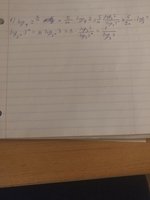You are using an out of date browser. It may not display this or other websites correctly.
You should upgrade or use an alternative browser.
You should upgrade or use an alternative browser.
I got stuck. Almost done
- Thread starter Soracyn11
- Start date
Dr.Peterson
Elite Member
- Joined
- Nov 12, 2017
- Messages
- 16,871
I would definitely express the LHS in terms of [MATH]log_2[/MATH], since the bases are all powers of 2. But do you see that [MATH]log_{2^n}\left(3^n\right) = log_2(3)[/MATH]? That isn't quite what the first (parenthesized) part of the LHS is.
The first line of your work looks correct, though it would be simpler if you used [MATH]log_2[/MATH] as I recommend.
The first line of your work looks correct, though it would be simpler if you used [MATH]log_2[/MATH] as I recommend.
Dr.Peterson
Elite Member
- Joined
- Nov 12, 2017
- Messages
- 16,871
Use the change of base formula! What else?
This is the kind of work I've suggested doing almost everywhere.
[MATH]\log_{2^n}\left(3^n\right) = \frac{\log_2{3^n}}{\log_2{2^n}} = \frac{n \log_2{3}}{n \log_2{2}} = \frac{\log_2{3}}{\log_2{2}} = \log_2(3)[/MATH]
This is the kind of work I've suggested doing almost everywhere.
Steven G
Elite Member
- Joined
- Dec 30, 2014
- Messages
- 14,603
a^2 + b^2 = c^2 --> c^2 -b^2 = a^2 ---> (c+b)(c-b) = a^2
log(c+b)[(c+b)(c-b)] = 2log(c+b)a
log(c+b)(c+b) + log(c+b)(c-b) = 2log(c+b)a
You need to make this work! If we multiply both sides by log(c-b)a then the rhs is exactly what we want. So let's do this.
log(c-b)a *(log(c+b)(c+b) + log(c+b)(c-b)) = 2log(c+b)alog(c-b)a
log(c-b)a log(c+b)(c+b) + log(c-b)a log(c+b)(c-b) = 2log(c+b)alog(c-b)a
log(c-b)a +log(c+b)a = 2log(c+b)alog(c-b)a
log(c+b)[(c+b)(c-b)] = 2log(c+b)a
log(c+b)(c+b) + log(c+b)(c-b) = 2log(c+b)a
You need to make this work! If we multiply both sides by log(c-b)a then the rhs is exactly what we want. So let's do this.
log(c-b)a *(log(c+b)(c+b) + log(c+b)(c-b)) = 2log(c+b)alog(c-b)a
log(c-b)a log(c+b)(c+b) + log(c-b)a log(c+b)(c-b) = 2log(c+b)alog(c-b)a
log(c-b)a +log(c+b)a = 2log(c+b)alog(c-b)a
Dr.Peterson
Elite Member
- Joined
- Nov 12, 2017
- Messages
- 16,871
Your work on the parenthesized part is wrong.I got 5/2n = 5/2 which does not equal. :/
Have you tried applying what I showed in #4 to each term?
Do it! I think you'll be surprised![MATH]\log_{2^n}\left(3^n\right) = \frac{\log_2{3^n}}{\log_2{2^n}} = \frac{n \log_2{3}}{n \log_2{2}} = \frac{\log_2{3}}{\log_2{2}} = \log_2(3)[/MATH]
This is the kind of work I've suggested doing almost everywhere.
Dr.Peterson
Elite Member
- Joined
- Nov 12, 2017
- Messages
- 16,871
This thread has been about problem 8, not 9. I think this belongs in a different thread.a^2 + b^2 = c^2 --> c^2 -b^2 = a^2 ---> (c+b)(c-b) = a^2
log(c+b)[(c+b)(c-b)] = 2log(c+b)a
log(c+b)(c+b) + log(c+b)(c-b) = 2log(c+b)a
You need to make this work! If we multiply both sides by log(c-b)a then the rhs is exactly what we want. So let's do this.
log(c-b)a *(log(c+b)(c+b) + log(c+b)(c-b)) = 2log(c+b)alog(c-b)a
log(c-b)a log(c+b)(c+b) + log(c-b)a log(c+b)(c-b) = 2log(c+b)alog(c-b)a
log(c-b)a +log(c+b)a = 2log(c+b)alog(c-b)a
pka
Elite Member
- Joined
- Jan 29, 2005
- Messages
- 11,978
More reason to have guidelines for images.This thread has been about problem 8, not 9. I think this belongs in a different thread.


